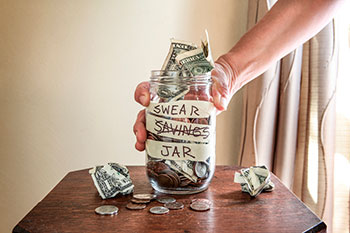Who really wants to be bad with money? Sometimes it just sort of happens, and you wake up one day in a difficult situation. If you can swap the bad money habits that creep into our lives for positive habits, and start making good financial decisions, you’ll be happier and less stressed out.

Living Without a Budget
The idea of a budget hurts, but it’s key for understanding how much money is coming in, what you can spend, and more importantly, what’s left over for saving and investing. Between all the apps and spreadsheets out there, it’s easy to plug in some basic information and start tracking. Weekly and daily updates will help keep you from spending out of control, which will help you avoid the next bad money habit.
Living Beyond Your Means
Overspending is one of the biggest challenges facing people today, with our consumption-driven economy and the fact that we hardly ever pay with cash. If you’re charging basic necessities, running up credit card balances, and borrowing money, you’re clearly spending more than you have. Allocating dollar amounts and holding yourself accountable is the way to do it. And, if you prefer to pay with plastic, use a debit card or pay your credit card off in full each month.
Using Auto-Pay for Everything
Automatic savings withdrawals are a fantastic way to save money because you don’t really feel it. But being desensitized is a bad thing if you’re automatically paying your bills. You need to feel how much money you’re really spending and plan to have enough money in the account. Automatic alerts that remind you to pay the bill are a much better way to do it.
Not Saving for Emergencies
The reason you need to save for a rainy day is because it’s definitely going to rain. You absolutely must have an emergency fund to cover unexpected expenses, like repairs, medical bills, or if you lose your job. Families need a minimum of three to six months of living expenses saved. If that’s out of reach for you right now, aim for at least $1,000 to have on hand to cover you, because you’ll need it.
Paying Your Bills Late
Paying your bills late is just irresponsible if you have the money, and if you don’t, it means you have bigger problems, like spending more than you make. Either way, this hurts your credit and can result in higher interest rates or even being denied for future loans. Don’t forget about all the late fees that come with paying late, too!
Living Off of Home Equity
A large chunk of credit at very low interest can be a recipe for disaster, like your home equity line of credit. Constantly using your HELOC is a very bad habit, and it’s easy to fall into the trap. Rates vary over time, which means your payments can skyrocket later, especially when you get to the point that you have to pay off the balance, not just interest.